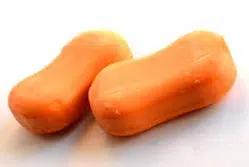There are different theories about the etymological origin of the term soap. However, one of the most powerful ones establishes that it derives from the Germanic “saipo”, which came to Latin as “sapone” and hence our current soap.
Soap is a product that is used to wash or sanitize . It is a substance obtained by combining the acids of a fatty body with an alkali : the result is a water-soluble element.
 Soap is usually made by combining potassium or sodium hydroxide with some lipid . This generates a chemical reaction called saponification and allows us to obtain the potassium or sodium salt that is the soap itself.
Soap is usually made by combining potassium or sodium hydroxide with some lipid . This generates a chemical reaction called saponification and allows us to obtain the potassium or sodium salt that is the soap itself.
It should be noted that an alkali is a compound with alkaline properties that acts as a base in an aqueous solution. Lipids , meanwhile, are organic molecules formed mainly by hydrogen and carbon that are hydrophobic (they do not mix with water). When an alkali, a lipid and water combine, saponification takes place, the result of which is soap.
It is possible to find solid, liquid or powder soaps . Solid or bar soap is the compound without the presence of water that is used to cause saponification. Liquid soap, on the other hand, is dissolved in water .
Soap is used to wash all types of objects and for personal hygiene thanks to the properties of its molecules . As soap has water-soluble components and fat-soluble components, when it comes into contact with water it acquires the necessary characteristics to remove stains and drag particles from a wide variety of surfaces.
Among the wide variety of soaps that exist, we can highlight, as the most famous, the following:
-Marseille soap, which is originally from the French city that gives it its name. Specifically, it is considered that it was in the Middle Ages when it began to be prepared, which is characterized by the fact that it is mostly made with olive oil.
-Castile soap, which has its origin in the towns of the Crown of Castile (Spain). It began to be made during the Modern Age and is prepared only with olive oil. Such was the fame it achieved that it was exported to many corners of the world.
-Aleppo soap comes from Syria and is considered one of the most important historical soaps. He arrived in Spain thanks to the Crusades. It has a very identifying smell and is made from two main ingredients: bay oil and olive oil. It is considered to be very good for fighting skin conditions such as acne .
-Portuguese white and blue soap has been well known around the world for a long time. If it has achieved such popularity it is because it is used both for personal hygiene of any person and for washing clothes or the home.
In the colloquial language of Uruguay and Argentina , on the other hand, a scare is known as soap. For example: “When the shelf fell I got some soap…” , “That dark night, in the middle of the forest, I had a great soap,” “What soap you gave me! "Don't come into my room like that again."
